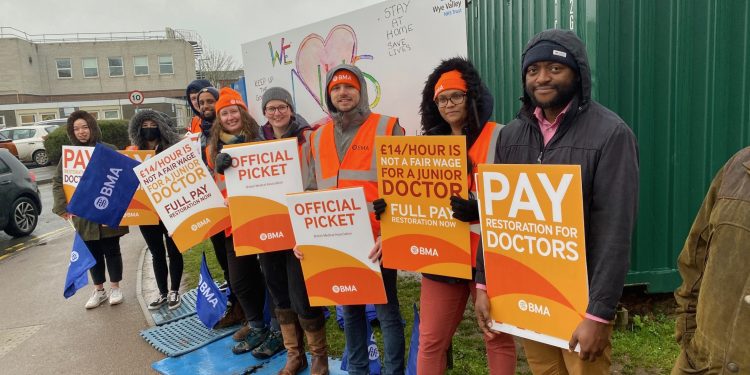A doctor of Indian origin who serves as co-chair of the junior doctors panel of the British Medical Association (BMA) has urged the UK government to take action as junior doctors across England began a four-day strike to demand a substantial pay increase in line with the rising inflation.
Dr Vivek Trivedi has been leading the campaign for “pay restoration” for around 45,000 junior doctors employed by the National Health Service (NHS). The doctors are requesting a 35% pay rise to compensate for 15 years of below-inflation wage increases.
While UK Health Secretary Steve Barclay has expressed his desire to settle the dispute, the government has claimed that the doctors’ pay demand is too high. The BMA has stated that the strike is in response to a 26% reduction in the real-term pay of junior doctors over the past 15 years.
The union has launched new ads in support of the pay dispute to demonstrate how little junior doctors are paid for their specialist roles in surgical procedures.
In a joint statement, Trivedi and co-chair Dr Robert Laurenson said that their work is highly skilled, requiring years of study and intensive training in a high-pressure environment where the job can be a matter of life and death. Despite their willingness to negotiate, they have not received any offer from the government and do not want to go on strike.
They added that fully restoring pay for junior doctors is a reasonable request given the essential healthcare services they provide. The spokesperson also stated that they are open to negotiations and have made an offer to start talks.
The strikes can be stopped if a credible offer is proposed by Mr Barclay. In England, over 40% of the medical workforce are considered junior doctors, who are qualified doctors with up to 8 years of experience in hospitals or up to 3 years in general practice.
Ranjit, a doctor for five years, detailed the pressures on junior doctors, forcing some to leave the NHS. He told WSWS, “Training jobs within the NHS don’t actually include a huge amount of training because of short staffing, the demands, and it’s often a case of service provision and patching gaps. And the training happens more in our free time.”
“Those sorts of conditions and the difficulties in working have led to a lot of my colleagues leaving to either go to Australia or New Zealand or to go into private industry where they’re treated a lot better. What pay restoration would do is reverse that sort of drain, because we’re losing a lot of doctors.”
“I don’t really want to go halfway across the world, and I like the NHS as a concept and I like my work as a doctor. But it’s compromise after compromise,” said Ranjit.
He added, “When you go into this training role you realise that your teaching may be cancelled week on week because of demand or there is no one around to do it. You realise you may be moved to a different placement which is not what you wanted to do and you might then spend four to six months doing something you don’t really want to do, merely to satisfy a ‘training need’.”
The strikes are expected to be the most disruptive in NHS history, and Professor Sir Stephen Powis, the national medical director for the NHS in England, acknowledges that there will be immense pressure and some patients’ appointments may be postponed.
The UK government has requested that the strike be called off before negotiations can begin and the strike is expected to last until early Saturday morning.











